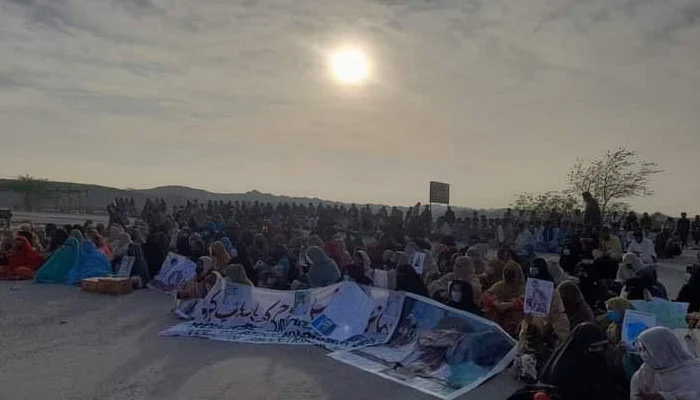Lost in limbo
The missing persons issue in Pakistan has persisted for years, affecting countless families across the country. While the exact number of missing persons is difficult to ascertain due to unreported cases and lack of reliable data, various human rights organizations estimate the figures to be alarmingly high.
The courts have not been remiss in attending to this issue – though without much success. In the most recent instance, last month the Islamabad High Court directed the government to recover around 50 ‘missing’ students from Balochistan within a week or caretaker Prime Minister Anwaarul Haq Kakar would have to appear before the court.
The Sindh High Court had also taken strict notice of missing persons while hearing a petition related to enforced disappearances.
Unfortunately, the current caretaker PM and caretaker interior minister have been less than helpful with their statements about missing persons, claiming that they have either gone ‘missing’ because they’ve gone to Afghanistan on their own or some have died during terrorist activities. The court however has not given these statements more attention than they deserve. The fact is that enforced disappearances not only violate the right to life and liberty but also contribute to a culture of fear and distrust within society. Families left in the dark about the fate of their loved ones endure unimaginable suffering, with emotional, psychological, and financial repercussions. That such disappearances cut across diverse demographics, with individuals from different ethnic, religious, and socio-economic backgrounds being affected makes it even more of a damning indictment of the country’s executive, judicial and institutional mechanisms. There are people who have been missing for decades now but there has been no redressal by the state or even the Commission of Inquiry on Enforced Disappearances, which was established in 2011. Whoever is at ‘fault’ needs to review the policy of hushing up this issue – which regardless does not seem to go away since the disappearances have hardly ever stopped. Families of the missing persons have been out on the roads in extreme weather, travelling hundreds of miles away from their homes with just one demand: the return of their loved ones. And it is only because of the apathy that the state has shown over these years that people point to state complicity in this.
Addressing the missing persons issue requires a multi-faceted approach involving government institutions, law-enforcement agencies, and civil society. One of the major challenges in addressing the missing persons issue in Pakistan is the apparent lack of accountability. The absence of a transparent and effective system for investigating and resolving such cases has created an atmosphere of impunity, allowing the perpetrators to operate without fear of consequences. This lack of accountability undermines the rule of law and erodes public trust in state institutions. As families wait for year after painful year for their disappeared to return, it is important to realize that extending some help and support will go a long way in rebuilding the broken trust between the people and the state.
-
 Expert Reveals What Makes Investigations Hard In Search Of Savannah Guthrie Mother Nancy: 'Silent Witness'
Expert Reveals What Makes Investigations Hard In Search Of Savannah Guthrie Mother Nancy: 'Silent Witness' -
 'SNL's Strongly Reacts To BAFTA's Racial Slur With Tourette’s Sketch
'SNL's Strongly Reacts To BAFTA's Racial Slur With Tourette’s Sketch -
 Austin Shooting Leaves Multiple Dead, Dozens Injured
Austin Shooting Leaves Multiple Dead, Dozens Injured -
 Meghan Markle Friends Break Silence As Duchess Plan To Return To UK
Meghan Markle Friends Break Silence As Duchess Plan To Return To UK -
 Dua Lipa Stuns Everyone On And Off Stage At 2026 BRIT Awards
Dua Lipa Stuns Everyone On And Off Stage At 2026 BRIT Awards -
 2026’s Most Visited Websites Revealed: ChatGPT Overtakes Major Platforms
2026’s Most Visited Websites Revealed: ChatGPT Overtakes Major Platforms -
 Worst Cricket Moments That Shocked The Game
Worst Cricket Moments That Shocked The Game -
 Prince Harry, Meghan Markle Reach A Crossroads: ‘You Could Lose Everything’
Prince Harry, Meghan Markle Reach A Crossroads: ‘You Could Lose Everything’ -
 F1 Title Race: Who Will Win 2026 Drivers’ And Constructors’ Championships?
F1 Title Race: Who Will Win 2026 Drivers’ And Constructors’ Championships? -
 New Observatory Sends 800,000 Asteroid Alerts In One Night
New Observatory Sends 800,000 Asteroid Alerts In One Night -
 Cher’s Son Elijah Blue Allman Apprehended On Two Counts Of Assault At Elite Prep School
Cher’s Son Elijah Blue Allman Apprehended On Two Counts Of Assault At Elite Prep School -
 Beatrice, Eugenie Now Face Andrew, Sarah's ‘nightmares’: 'They're Hugely Conflicted'
Beatrice, Eugenie Now Face Andrew, Sarah's ‘nightmares’: 'They're Hugely Conflicted' -
 X Debuts Topic Filtering To Help Users Shape Their ‘For You’ Recommendations
X Debuts Topic Filtering To Help Users Shape Their ‘For You’ Recommendations -
 Scientists Built World's First Computer That Learns Like Human Brain
Scientists Built World's First Computer That Learns Like Human Brain -
 Robert Carradine’s Daughter Makes Bombshell Confession As Actor's Death Cause Confirmed
Robert Carradine’s Daughter Makes Bombshell Confession As Actor's Death Cause Confirmed -
 Beatrice, Eugenie Put On Blast: ‘Only Nitwits Wouldn’t See An Association With A Pedophile As Toxic’
Beatrice, Eugenie Put On Blast: ‘Only Nitwits Wouldn’t See An Association With A Pedophile As Toxic’




